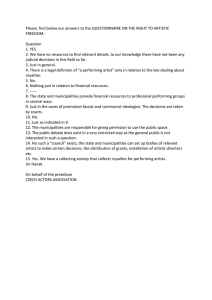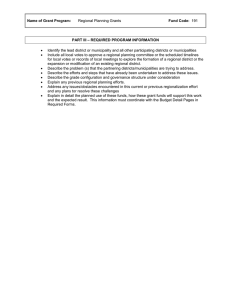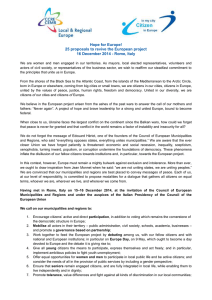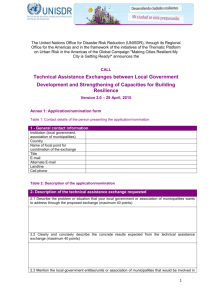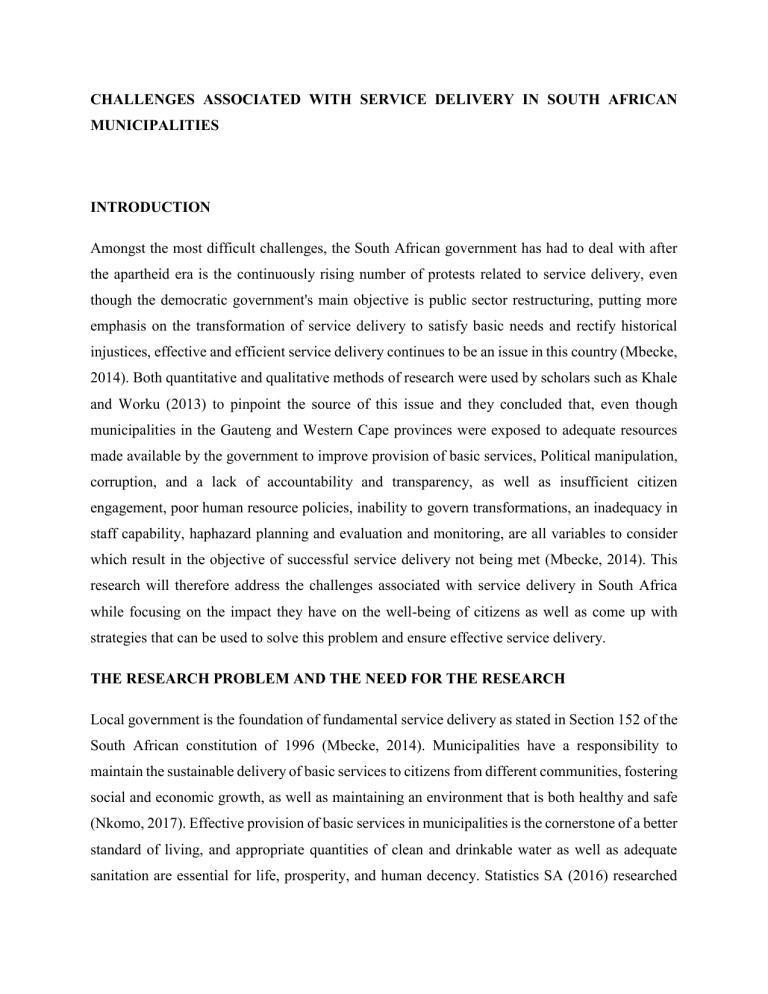
CHALLENGES ASSOCIATED WITH SERVICE DELIVERY IN SOUTH AFRICAN MUNICIPALITIES INTRODUCTION Amongst the most difficult challenges, the South African government has had to deal with after the apartheid era is the continuously rising number of protests related to service delivery, even though the democratic government's main objective is public sector restructuring, putting more emphasis on the transformation of service delivery to satisfy basic needs and rectify historical injustices, effective and efficient service delivery continues to be an issue in this country (Mbecke, 2014). Both quantitative and qualitative methods of research were used by scholars such as Khale and Worku (2013) to pinpoint the source of this issue and they concluded that, even though municipalities in the Gauteng and Western Cape provinces were exposed to adequate resources made available by the government to improve provision of basic services, Political manipulation, corruption, and a lack of accountability and transparency, as well as insufficient citizen engagement, poor human resource policies, inability to govern transformations, an inadequacy in staff capability, haphazard planning and evaluation and monitoring, are all variables to consider which result in the objective of successful service delivery not being met (Mbecke, 2014). This research will therefore address the challenges associated with service delivery in South Africa while focusing on the impact they have on the well-being of citizens as well as come up with strategies that can be used to solve this problem and ensure effective service delivery. THE RESEARCH PROBLEM AND THE NEED FOR THE RESEARCH Local government is the foundation of fundamental service delivery as stated in Section 152 of the South African constitution of 1996 (Mbecke, 2014). Municipalities have a responsibility to maintain the sustainable delivery of basic services to citizens from different communities, fostering social and economic growth, as well as maintaining an environment that is both healthy and safe (Nkomo, 2017). Effective provision of basic services in municipalities is the cornerstone of a better standard of living, and appropriate quantities of clean and drinkable water as well as adequate sanitation are essential for life, prosperity, and human decency. Statistics SA (2016) researched the state of service delivery in South Africa and discovered that residents' perceptions of the services they receive differ substantially between different municipalities such that those from municipalities located in urban areas receive better services than those located in the rural areas. From this statement, a conclusion can be drawn that rural municipalities are more affected by factors such as corruption, mismanagement of government funds as well as inadequate citizen participation, such that the social and economic growth in these areas has been affected negatively due to the inability of municipalities to provide basic services. THE RESEARCH AIMS AND OBJECTIVES This research paper seeks to achieve its objectives of recognizing the challenges that ambush the abilities of municipalities to effectively provide services by paying more attention to the objectives listed below: To examine the underlying causes of service delivery issues that municipalities face. To examine the effects of service delivery issues on societies. To explore solutions to reduce the challenges of service delivery. THE RESEARCH QUESTIONS What are the most common reasons for service delivery problems? What influence do issues in service delivery have on communities? What can be done to reduce the challenges of service delivery? THEORY Service delivery: Service delivery is whereby the government provides fundamental services that are sufficient, affordable, and of excellent quality through the different municipalities that exist in provinces. These services may include amongst others drinkable water and sanitation, infrastructure as well as health services. Over the last few decades, enormous progress was made in the delivery of essential services, however, Citizens living in rural areas have had far less access to these services and the government recognises this setback and is therefore required to come up with innovative measures to improve and sustain the system (Mbecke, 2014). Corruption: Corruption can be referred to as the practice of unlawfully manipulating the decision-making process by providing or obtaining compensation (appreciation) for the decision-maker or other related parties. Act No 12 of 2004 known as the Prevention and Combating of Corrupt Activities is the South African legislation that was introduced to criminalise those involved in corruption (ProEthics, 2011). Public Participation: Section 152 of the South African constitution states that, local authorities must encourage members of the community, institutions and other organizations to participate in affairs concerning the local government. At the municipal level, public participation is a tool for promoting a culture of good government. One of the most successful approaches to strengthen accountability and transparency is to reveal the state's major functions to citizens. Public participation can be achieved through community meetings which can be organized by the community councils, and this will give citizens the platform they need to voice out the different issues they face in their community. RESEARCH METHODOLOGY This study intends to use both the quantitative and qualitative approaches whereby the goal of the qualitative method is to learn and comprehend how people experience events and circumstances. Whereas the quantitative approach concentrates on objective data acquisition using analytical, mathematical, or numerical methods of collecting data, and tools such as surveys and interviews, as well as modifying pre-existing statistical data using computing tools can be used to collect the required statistical information. The data for this research was gathered by utilizing Secondary data from online journals, articles, and newspapers to obtain more information on the state of service delivery in different municipalities. The target population sampled was some of the 278 municipalities in South Africa to compare and contrast the level in which each one receives basic services as well as the response of citizens to these services. REFERENCE LIST Statistics South Africa. 2016. The state of basic service delivery in South Africa: In-depth analysis of the Community Survey 2016 data. Available from: http://www.statssa.gov.za/publications/Report%2003-01-22/Report%2003-01-222016.pdf. [ 17 March 2022] Khale, S. & Worku, Z. 2013. Factors that Affect Municipal Service Delivery in Gauteng and North West Provinces of South Africa African Journal of Science, Technology, Innovation, and Development 5 (1): 61-70 Mbecke. Z. 2014. Resolving the service delivery dilemma in South Africa through a cohesive service delivery theory Journal of Problems and Perspectives in Management 12(4): 265. Available from: https://www.businessperspectives.org/index.php/journals?controller=pdfview&task=download&i tem_id=6133. [15 March 2022]. Nkomo. S. 2017. Public service delivery in South Africa Councillors and citizens critical links in overcoming persistent inequities. Available from: https://media.africaportal.org/documents/ab_policypaperno42_local_service_delivery_in_southaf rica.pdf. [15 March 2022] ProEthics. 2011. Defining Corruption. Available from: https://www.proethics.co.za/wpcontent/uploads/2015/02/Defining-corruption-May-2011-FINAL.pdf. [18 March 2022]
